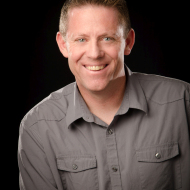
The creator of the documentary film “The Forgiveness Journey” told audiences on Friday that the elements of forgiveness seem almost identical across religions.
The Parliament of the World’s Religions is dedicated to creating harmony between different faiths, so Matt Duhamel’s film made for an appropriate discussion during a breakout session during the international conference in Salt Lake City.
Duhamel produced the film to increase compassion, understanding and forgiveness among all people. He discussed some of the film’s powerful personal stories of forgiveness.
Background research he conducted before producing the film helped him to understand American ideas of forgiveness.
“I found that spirituality is a common factor in Americans who are more willing to forgive,” Duhamel said. “That is probably because forgiveness is a common principle amongst all religions.”
Duhamel shared a film clip of Dalai Lama and his attitude on forgiveness.
“Tolerance is a sign of strength not of weakness,” the spiritual leader said in the video. “Buddhist teaching is to control anger. The thing already happened; anger will not help.” The Dalai Lama was originally scheduled to appear at the Parliament, but became ill and announced weeks ago that he would have to bow out.
This idea of mastering oneself is a theme Duhamel repeatedly addressed as he shared story after story of those who forgave.
Duhamel’s portrayals of forgiveness included a woman who had forgiven the murderer of her son so thoroughly that now she and her son’s murderer are next door neighbors and even friends.
Another clip shared was the story of Kurtis, who was severely abused as child by his uncle, causing Kurtis to be paralyzed in the left side of his body. Later in life, Kurtis — who had been adopted by a Christian woman — wanted to seek out his uncle to let him know he had forgiven him.
“The pain and hurt are still there, but I have to forgive so others, so God will forgive us,” Kurtis said in the film. “And I don’t want to carry around that hate and anger; it is too heavy.”
Duhamel also shared the story of the 2006 West Nickel Mines School shooting in Lancaster County, Pennsylvania, and how the Amish mandate to forgive was taken so literally that the parents of the deceased child victims actually comforted the murderer’s mother.
Nelson Mandela’s decision not to punish the South Africans who imprisoned him, but rather to focus on creating a unified country when he was elected president, is another example Duhamel lauded during the presentation.
A local Native American, Arnold Thomas, is also featured in the film. After attempting suicide, Thomas was blinded, received horrible scars on his face and suffered other physical difficulties. “When I didn’t die but just succeeded in ruining my chances to live a normal life, I had to get started in accomplishing the hardest type of forgiveness: the forgiveness of your own self,” Thomas said in the film.
Finally, Duhamel shared a video clip of religious leaders from different faiths sharing their thoughts on forgiveness. A Catholic priest, Buddhist monk, Lutheran pastor, Jewish rabbi, Hindu woman and Muslim man all echoed the same idea, that “forgiveness blesses the forgiver.”
The discussion ended with comments and questions from the audience focused on learning to apply forgiveness in one’s personal life.




